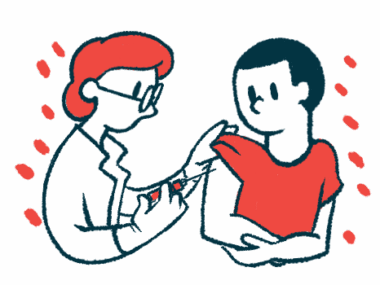I Get By With a Little Help From My Friends
Written by |

I stared down at the incoming text message and completely froze.
The beeps from her monitor in the pediatric intensive care unit (PICU) had finally settled into a consistent rhythm. Although our oldest daughter, whom we lovingly refer to as Ladybug, was resting, my adrenaline was still pumping from the events that had occurred 24 hours prior.
At the time, I had no idea Ladybug was experiencing a laryngeal flare due to her hereditary angioedema. All I knew to do was to speed to the emergency room and watch as they feverishly tried to keep her throat from completely closing.
I had managed to remain calm when alarms sounded because her heart rate escalated when they hooked her up to an epinephrine drip. I’d kept it together when the on-call pediatrician started whispering “PICU” to the nurses. And although they didn’t have to intubate her, I’d maintained a sense of balance when they had no idea what to do next.
But the moment I received that text message, I froze.
“What do you need?” one of my best friends had typed. I finally put the phone down without replying. The question was genuine, but I had no answer. I’d never experienced anything like this, and at that moment, I convinced myself it would be the last time.
That wasn’t the case.
With every subsequent hospital admission, days away from my husband and other children, and countless doctor appointments, I would get the same text message that would short-circuit my brain.
“Tell me what you need,” they would read. Soon, it stopped being from just one friend and started coming from several. And each time, I had the same reaction: I would stare at it, shake my head, and put my phone down. I did this for a few years.
What did I need? A clone? A maid? Answers? None of those replies made sense in my head. Besides, I had everything covered at the hospital, while my husband had everything covered at home. Plus, if we found ourselves in a bind, we had other family members in the city. So we shouldn’t need anything else. Right?
By 2021, after Ladybug’s official diagnosis, I became more frustrated with those types of text messages. It’s not like I could reply to the text by typing, “Hey, can you do this Berinert infusion for me?” or, “Could you swing by the house and give Ladybug her subcutaneous Haegarda therapy?” or even, “Can you come do some momming?” It was easier to remain silent.
What does receiving help even look like to a caregiver? Our circumstances groom us to be self-sufficient. We operate in late nights, early mornings, and hours that would exceed the average workweek. Most of the time, the emergencies aren’t scheduled, the disasters aren’t convenient, and the solutions are cumbersome.
“Why don’t you ever answer that question?” one of my good friends asked when she saw me in person.
My efforts to play dumb about what she was referring to failed miserably. Until that moment, I had avoided any accountability of never replying.
“I don’t know how,” I finally admitted.
“What about dinner?” she suggested. “What if I sent dinner to your house? Or,” she continued, “when things are calm, I can take you to lunch, or we can go get coffee. Help doesn’t always have to be a huge thing, you know.”
I’m still learning this lesson.
When someone asks a caregiver what we need, it often gives us visions of epic interventions from cape-wearing superheroes swooping in to save the day. But in reality, it can be a phone call to chat about nonsense or an hour of conversation at a favorite coffee shop.
When people ask what we need, they’re not expecting us to come up with world-changing, grand gestures. Sometimes, the simplest task can make everything seem a little better.
Note: Angioedema News is strictly a news and information website about the disease. It does not provide medical advice, diagnosis, or treatment. This content is not intended to be a substitute for professional medical advice, diagnosis, or treatment. Always seek the advice of your physician or other qualified health provider with any questions you may have regarding a medical condition. Never disregard professional medical advice or delay in seeking it because of something you have read on this website. The opinions expressed in this column are not those of Angioedema News or its parent company, Bionews, and are intended to spark discussion about issues pertaining to angioedema.




Leave a comment
Fill in the required fields to post. Your email address will not be published.